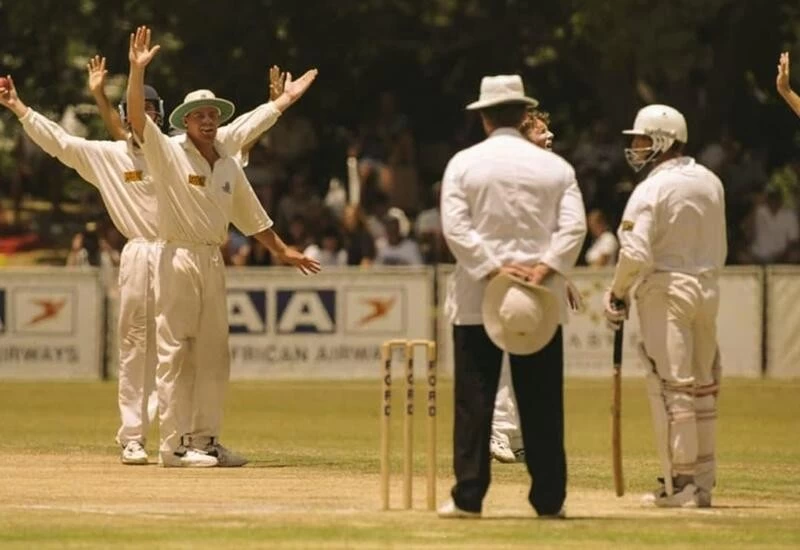Cricket Desk: England visit Victoria Falls today and it will be a wonder if no one throws himself off the edge. Never has a side come closer to winning a Test match without actually doing so but mention that by way of consolation and the response is one of numbed and dazed expressions.
"We murdered 'em, we flipping murdered 'em," said David Lloyd, England's coach, and he knew that changed nothing. For the first time in Test cricket the score book entry reads: "Match drawn with scores level."
England, boldly chasing 205 for victory in 37 overs, mentally won the match a thousand times but finished deeply frustrated on 204 for five.
Zimbabwe might be Test novices but never again will they be termed Test innocents. The negative bowling tactics they shamelessly employed throughout the final hour, as they persistently bowled well wide of the stumps without penalty, were legitimate enough, but they will deeply offend all those who extol the game's spirit.
One ball, in particular, sticks in the craw. The umpire Ian Robinson had an embarrassing matchi and his decision to judge the fourth ball of the final over as acceptable ranks as one of the most outrageous abdications of responsibility in Test history.
Heath Streak fired it so wide outside Nick Knight's off-stump that the left-hander, named Man of the Match for his 96 from 118 balls, would not have reached it with an extension.
The two tied Tests were essentially joyous affairs, with both sides able to celebrate an equal share of a special occasions. England, arguably as the only possible victors, came even closer to winning yesterday but there was no similar sense of excitement, just an excruciating recognition that success has eluded them. Ask Versace to dress up a draw and it would still seem just as undesirable.
Thirteen were needed from Streak's final over and, when Knight thrashed his third ball over deep-square for six, England were on the verge of a momentous victory. But the next ball passed by out of reach and Knight drove the fifth to long off for two runs.
With three required from the final ball, Knight lashed Streak to the cover boundary. "I middled it and thought I had a chance," he said, but Stuart Carlisle's throw helped run out Knight.
This was not the classiest Test ever played – the seam bowling on both sides was too mediocre for that – but the climax on this intimate Queen's Club ground was compelling. For Geoffrey Boycott to complain on BBC Radio that it was not proper Test cricket, that the bowling was too easy, that England were winning at a canter, not only proved to be inaccurate, but over-emphasised quality at the expense of sensation.
England rued the two hours lost to rain on the second day. Others, less fairly, concentrated on the time lost on the fourth afternoon when John Crawley, protecting the tail, became engaged in a prolonged tactical contest to keep the strike. More persuasively, they simply did not take Zimbabwe's last five wickets quickly enough yesterday.
Zimbabwe, 107 for five overnight, led by 77 and looked ripe for England's spinners, but they resisted until half an hour before tea and were within minutes of making a draw inevitable. The nightwatchman Bryan Strang was soon dismissed as he tried to strike Tufnell down the ground but adventurous half-centuries from Waller and Whittall carried the fight impressively.
Lloyd's irksome reference to "getting 15 of them out" was that of a man who felt that England's spinners had been refused several valid claims for bat-and-pad catches. Crawley's catch off Croft's bowling looked particularly persuasive but Paul Strang added only another single before falling to the same combination.
England, who appealed indiscriminately and in an impassioned manner than on Saturday brought a reprimand from the match referee Hanumant Singh, should consider where such an approach is counter-productive.
Waller was eventually removed by Gough's lifter, although his later new-ball spell was so unimpressive that it lasted only one over. Four wickets for Tufnell included Whittall, caught by the diving Croft at extra-cover.
England's required rate of 5.54 questioned Atherton's presence at the top of the order, and the captain soon dragged Olonga on to his stumps trying to cut. That introduced a stand of 137 in 26 overs between Knight and Stewart which, until its closing moments, promised victory.
Knight's willingness to risk the unorthodox provided initial impetus, while Stewart bossed and bristled like an army captain, never more so than with a straight six off Paul Strang.
Zimbabwe's immediate retreat into deep-set fields played into England's hands. Paul Strang's leg-spin in particular would have benefited from the presence of close catchers and, with 87 needed from the last 15 overs, a rare overseas win for England looked inevitable.
Knight, though, was slowed, initially by Grant Flower's leg-stump attack, latterly by Zimbabwe's negativity. Stewart, after reaching 73 from 76 balls, skied Paul Strang to Campbell, and Hussain departed without scoring as he slapped the leg-spinner to cover, second ball.
Whittall, riskily introduced with four overs left, caused Crawley to slice to deep cover; Thorpe's leg-side shot lobbed into the offside; England's chance had slipped away.


